Your cart is currently empty!
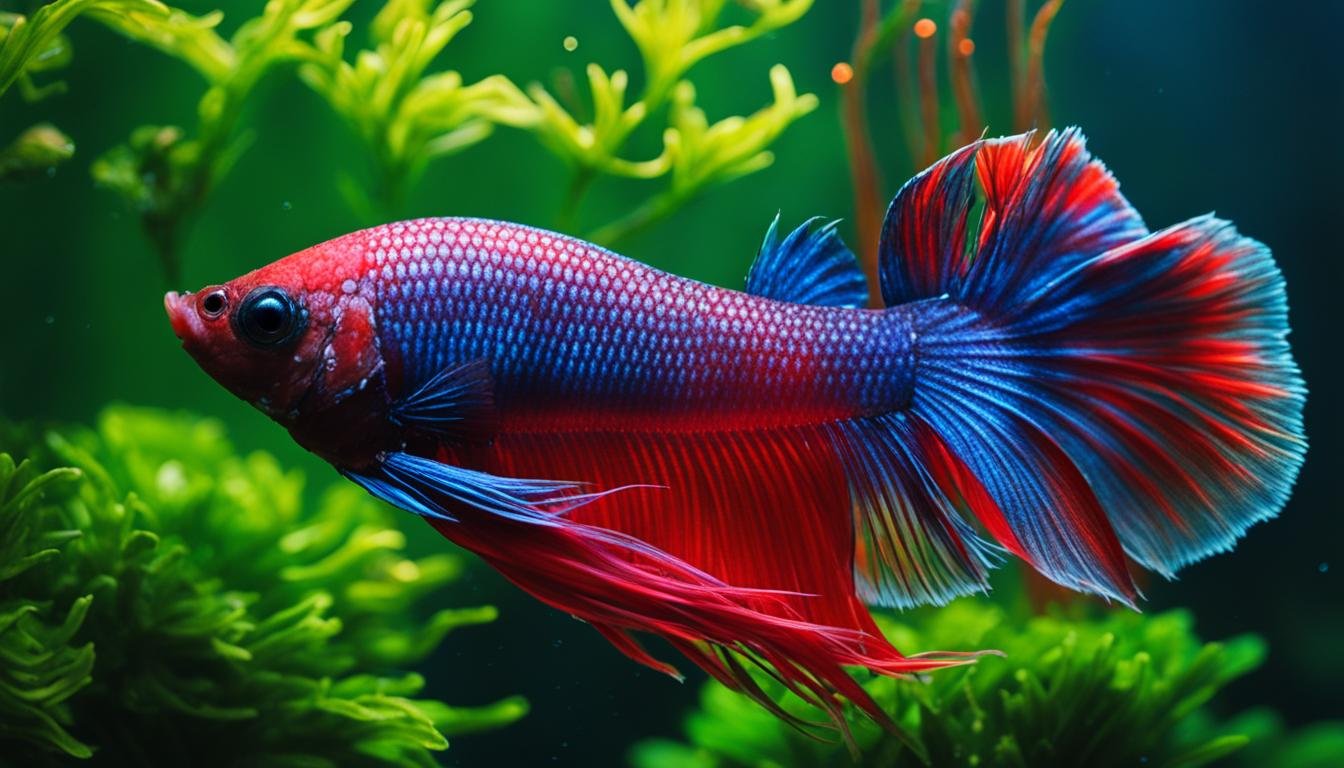
Can Betta Fish Eat Bloodworms? Dive into Their Diet!
Are you wondering if betta fish can eat bloodworms? We’ll explore their diet and find out if it’s safe to feed them this popular food. Betta fish are known for being picky eaters, so finding the right food can be a challenge for many owners. While bloodworms may seem like a tempting option, it’s important to understand their role in a betta fish’s diet. Let’s dive in and learn more!
Key Takeaways:
- Betta fish can eat bloodworms, but they should not be the sole source of nutrition.
- A balanced diet with other food options is essential for meeting a betta fish’s nutritional needs.
- Feeding bloodworms in moderation will prevent health issues in betta fish.
- There are different types of bloodworms available, including fresh/live, frozen, and freeze-dried.
- Overfeeding bloodworms can lead to obesity, constipation, and other health problems in betta fish.
Can You Feed Bloodworms to Your Betta?
When it comes to feeding your betta fish, bloodworms can be a tempting option. These small, red worms are a popular choice among bettas due to their enticing movement and rich protein content. But can you feed bloodworms to your betta?
The answer is yes, but with some important considerations. While bloodworms can be included as part of your betta fish’s diet, they should not be the sole source of nutrition. Betta fish require a varied diet to meet all of their nutritional needs. Feeding them only bloodworms can lead to deficiencies in essential minerals, vitamins, and other nutrients.
It’s important to provide a balanced diet that includes other food options, such as high-quality betta pellets or flakes, to ensure optimal health for your fish. Bloodworms can be given as a treat or occasional supplement to their regular diet. Remember to feed them in moderation and consider the size and age of your betta when determining the appropriate amount of bloodworms to offer.
By offering a diverse diet, you can ensure that your betta fish receives all the necessary nutrients for a healthy and thriving life. So go ahead and feed your betta bloodworms, but remember to provide a well-rounded and balanced diet to keep them happy and healthy!
How Do You Feed Bloodworms to a Betta?
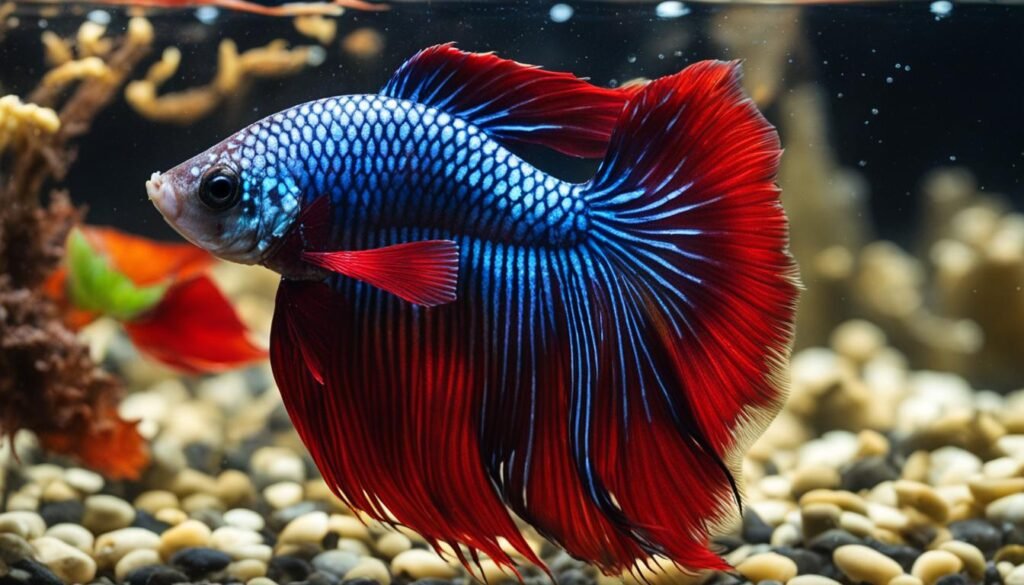
Feeding bloodworms to a betta fish can be done in various ways, depending on the type of bloodworms and the preferences of your fish. Here are some guidelines for properly feeding bloodworms to your betta:
1. Live Bloodworms:
If you have live bloodworms, you can simply drop them into the fish tank. Bettas are attracted to live prey, and they will actively hunt and consume the bloodworms. This method provides a more natural feeding experience for your betta.
2. Frozen Bloodworms:
If you are using frozen bloodworms, it’s best to cut the cube into small bite-sized pieces to make it easier for your betta to consume. Thaw the bloodworms before feeding them to your fish. You can either thaw them in the refrigerator overnight or quickly thaw them in a small container of aquarium water.
3. Freeze-Dried Bloodworms:
If you are using freeze-dried bloodworms, it’s important to rehydrate them before feeding. Soak the bloodworms in aquarium water for at least 15 minutes to prevent bloating in your betta’s gut. Once they are soft and plump, you can offer them to your fish.
Remember to monitor the amount of bloodworms you feed your betta to prevent overfeeding. Offer bloodworms as a treat or supplement to their regular diet, which should consist of a variety of other foods to ensure they receive all the necessary nutrients. Following these guidelines will help you properly feed bloodworms to your betta fish and keep them happy and healthy.
Different Types of Bloodworms
When it comes to feeding betta fish, there are different types of bloodworms available that can be a nutritious addition to their diet. It’s important to understand the options and choose the most suitable type based on availability and the specific nutritional needs of your betta fish.
Fresh/Live Bloodworms
Fresh/live bloodworms are sourced from freshwater ponds and offer a higher nutritional value compared to other types. They are natural prey for bettas and provide essential proteins and nutrients. If you have access to fresh/live bloodworms, they can be an excellent choice.
Frozen Bloodworms
Frozen bloodworms are a convenient option for feeding betta fish. They have a longer shelf life and can be easily stored. Frozen bloodworms retain much of their nutritional value, making them a great alternative if fresh/live bloodworms are not readily available to you.
Freeze-Dried Bloodworms
Freeze-dried bloodworms come in a dehydrated form and are easy to handle and store. They offer graded qualities, allowing you to choose high-quality freeze-dried bloodworms for your betta fish. However, it’s important to note that freeze-dried bloodworms may have lower nutritional value compared to fresh/live or frozen options.
When selecting the type of bloodworms to feed your betta fish, consider factors such as freshness, availability, and nutritional content. Providing a varied diet that includes other food options is essential to meet your betta fish’s overall nutritional needs.
What Happens When You Overfeed Bloodworms to a Betta?
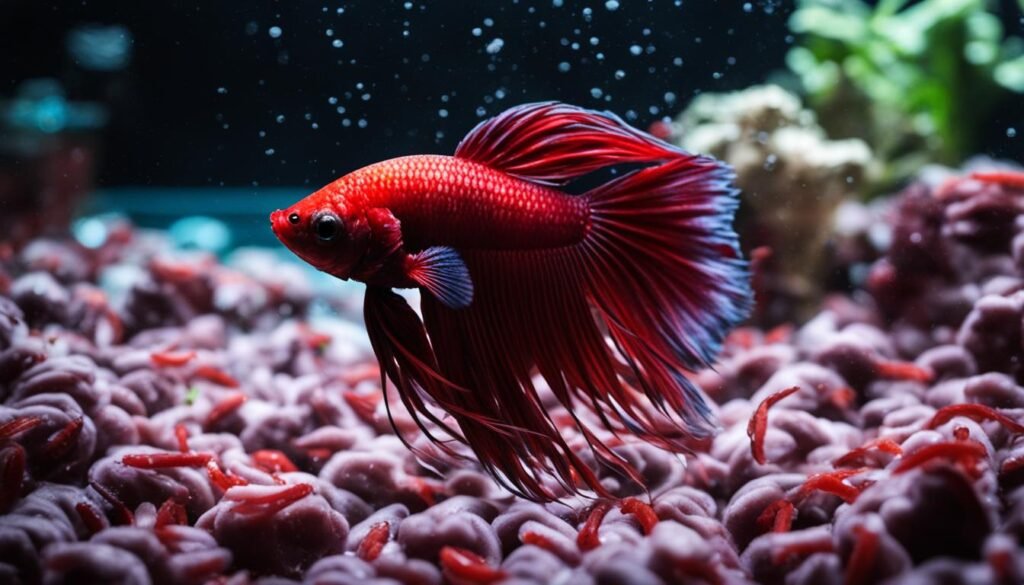
If you overfeed bloodworms to your betta fish, it can lead to various health issues. While bettas may enjoy these tasty treats, excessive consumption can have detrimental effects on their well-being. Here are some of the risks associated with overfeeding bloodworms to your betta:
- Obesity: Overfeeding bloodworms can cause your betta fish to become overweight. This can lead to swim bladder issues and difficulty swimming.
- Constipation: Bloodworms are high in protein but lack essential fibers. Feeding too many can result in constipation, which can be uncomfortable for your betta.
- Fatty Liver Disease: A diet rich in bloodworms can cause fatty liver disease in betta fish. This condition can be life-threatening and may require medical intervention.
- Ammonia Spikes: Bloodworms produce waste that can increase ammonia levels in the tank. This can affect water quality and have a negative impact on your betta’s health.
To ensure the well-being of your betta fish, it’s important to establish a feeding schedule and provide a balanced diet. While bloodworms can be included as part of their meal plan, they should not be the sole source of nutrition. Incorporate other food options like high-quality pellets, flakes, and live or frozen foods to meet their nutritional needs. Remember, moderation is key when it comes to feeding bloodworms to your betta!
Key Takeaways:
- Overfeeding bloodworms to betta fish can lead to obesity, constipation, fatty liver disease, and ammonia spikes in the tank.
- Bloodworms should not be the sole source of nutrition for bettas; a balanced diet with a variety of food options is crucial.
- Establish a feeding schedule and feed bloodworms in moderation to ensure the health and well-being of your betta fish.
Bloodworms and Specific Fish Types
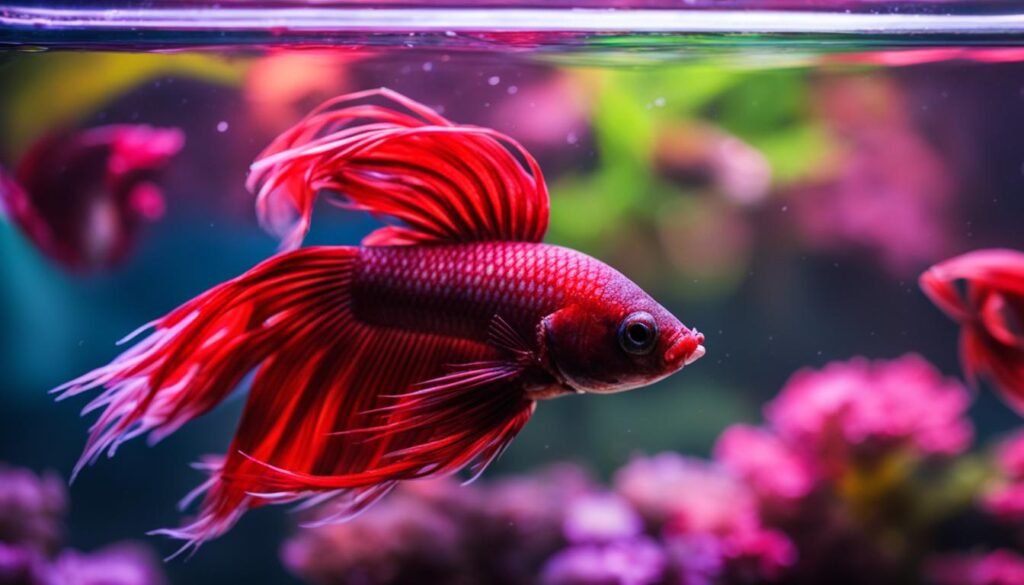
When it comes to bloodworms, they are not only a tasty treat for betta fish but also for other fish species. Here are a few fish that enjoy eating bloodworms:
- Goldfish: Bloodworms can be beneficial for goldfish, especially during the winter when their diet may be limited. These protein-rich treats can provide additional nutrients for goldfish.
- Swordtails and Guppies: These omnivorous fish readily eat bloodworms and can gain nutritional benefits from them. Bloodworms can be a great supplement to their regular diet.
- Eels: As meat-eaters, eels can also consume bloodworms as part of their diet. However, it’s important to avoid overfeeding them with bloodworms to prevent any health issues.
Adding bloodworms to the diet of these fish species can provide them with variety and added nutrition. However, it’s important to note that bloodworms should not be their sole source of food. A balanced diet that includes other food options is essential for meeting their nutritional needs.
Considerations for Bloodworm Supply
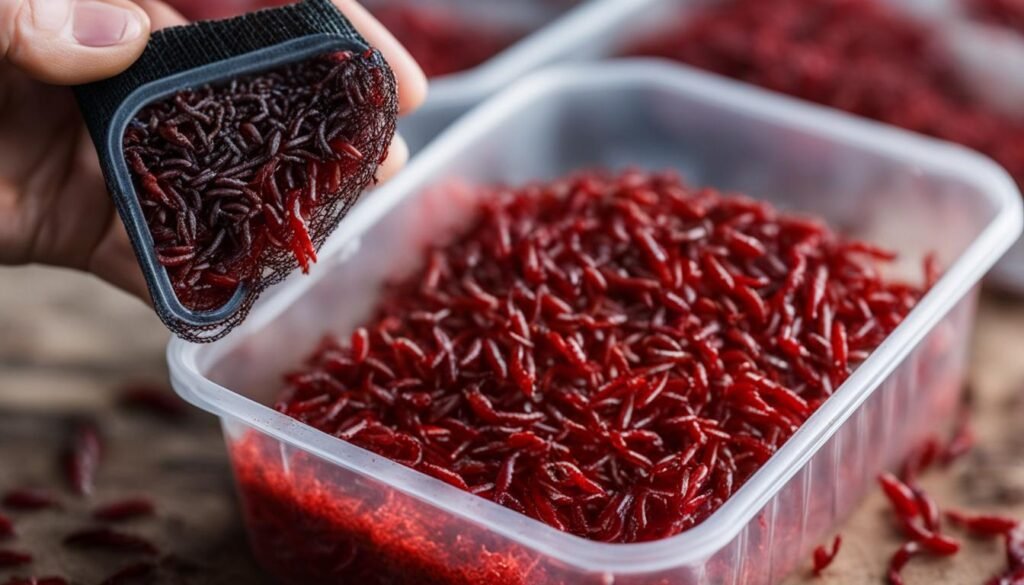
When it comes to supplying bloodworms to fish tanks, there are a few important considerations to keep in mind. While bloodworms can be a nutritious food source for fish, it’s crucial to remember that they should not be the sole staple diet. Bloodworms lack essential nutrients that fish need for their overall health and well-being.
One key risk of overfeeding bloodworms is the potential for health problems in both the fish and the tank environment. Overfeeding can lead to constipation in the fish, which can be detrimental to their digestive system. Additionally, excessive feeding can cause an increase in ammonia levels in the tank, which can be harmful to the fish and other aquatic life present.
In order to prevent digestive issues, it’s important to soak frozen and freeze-dried bloodworms before feeding them to the fish. This helps to ensure that the bloodworms are properly hydrated and easier for the fish to digest. By providing a balanced diet that includes a variety of food options and using bloodworms as an occasional treat, you can help maintain the health and well-being of your fish and the overall ecosystem of the tank.
Conclusion
After exploring the role of bloodworms in a betta fish’s diet, we can conclude that while they can be included as part of their food, they should not be relied upon as the sole source of nutrition. Betta fish require a balanced diet that incorporates various food options to meet their nutritional needs.
While bloodworms offer a good source of protein, they lack essential nutrients that bettas need for overall health. It is crucial to provide a varied diet that includes other food choices to ensure a betta fish’s well-being.
When feeding bloodworms to betta fish, it is important to feed them in moderation to prevent health issues. Overfeeding bloodworms can lead to obesity, constipation, fatty liver disease, and increased ammonia levels in the tank. It is also recommended to soak frozen and freeze-dried bloodworms before feeding to prevent digestive problems.
By considering these factors and maintaining a balanced diet, you can ensure that your betta fish and other fish species enjoy a healthy and nourishing diet. Remember, bloodworms can be a delicious treat, but they should not be the sole focus of their meals. Take care of your betta fish’s nutritional needs for a thriving and vibrant aquatic companion!
FAQ
Can betta fish eat bloodworms as their main food?
No, betta fish cannot live solely on bloodworms as they lack the necessary nutrients for their overall health. Bloodworms should be part of a balanced diet that includes other food options.
How should I feed bloodworms to my betta fish?
If using live bloodworms, simply drop them into the fish tank as bettas are attracted to live prey. For frozen bloodworms, cut the cube into small pieces and allow them to thaw before feeding. Soak freeze-dried bloodworms in aquarium water for 15 minutes before serving to prevent bloating in the betta fish’s gut.
What are the different types of bloodworms available for feeding betta fish?
There are three main types: fresh/live bloodworms, frozen bloodworms, and freeze-dried bloodworms. Fresh/live bloodworms offer higher nutritional value, frozen bloodworms are convenient and have a longer shelf life, and freeze-dried bloodworms are easy to handle and have graded qualities.
What happens if I overfeed bloodworms to my betta fish?
Overfeeding bloodworms can lead to health issues such as obesity, constipation, fatty liver disease, and increased ammonia levels in the tank. It’s important to establish a feeding schedule and provide a balanced diet to avoid these problems.
Can other fish species eat bloodworms?
Yes, bloodworms are a delicious treat for various fish species including goldfish, swordtails, guppies, and eels. However, it’s important not to overfeed these fish with bloodworms as it can lead to health issues.
What considerations should I keep in mind when supplying bloodworms to fish tanks?
Bloodworms should never be the sole staple food for fish, as they lack essential nutrients. Overfeeding or frequent feeding of bloodworms can lead to health problems for both the fish and the tank. Soak frozen and freeze-dried bloodworms before feeding to prevent digestive issues in fish.
What is the conclusion about feeding bloodworms to betta fish?
Bloodworms can be included as part of a betta fish’s diet, but they should not be the sole source of nutrition. Providing a balanced diet that includes other food options is essential for meeting a betta fish’s nutritional needs.
Leave a Reply